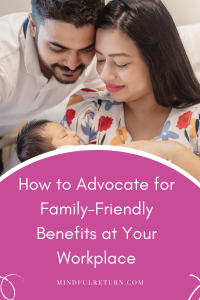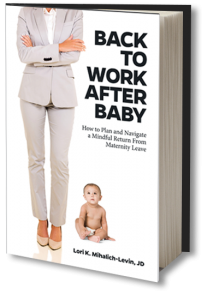 Advocate? Huh? When you thought about having a baby or welcomed your first child to your family, you probably didn’t have “become an advocate for other working parents” at the top of your to-do list.
Advocate? Huh? When you thought about having a baby or welcomed your first child to your family, you probably didn’t have “become an advocate for other working parents” at the top of your to-do list.
Yet when many of us have a negative or lackluster working parent experience at our workplace, we get fired up. We become determined to put supports in place, so that others don’t have to suffer the same experience we did.
This was certainly the story for me. Why did I start Mindful Return 8 years ago? Sheer desperation. Yes, I wanted to work toward gender equality and stop the leak in the leadership pipeline that so often occurs when a child enters the picture. But even more than that, I wanted to spare other new parents the experience of feeling lonely and defeated in working parenthood.
This fire and passion led me to become a serial founder of two working parent affinity groups / ERGs, to start the Working Parent Group Network for the leaders of working parent and caregiver ERGs, to co-host the Parents at Work Podcast, and ultimately to lead a global team of working parent course coaches at Mindful Return.
Here are a few things I’ve learned over the past decade about how to get employers to do more for working parents.
10 Advocacy Strategies for Family Friendly Benefits
Want to make change for working parents within your own organization? These 10 strategies are helpful to keep in mind as you embark on your advocacy journey:
- Play the long game. Know that change rarely happens overnight. (Sometimes turnaround time is blissfully quick and we get what we request right away – see inspiration below! – but that’s not always the case.) Set out on your mission to improve things for working parents with a long time horizon. Pick one thing you’d like to see changed. Push hard. And give it a year. See where you land.
- Muster your patience. You know that patience muscle that parenthood is helping you strengthen every day? Employ it here. People may not be equally passionate about your concerns. Or they may not fully understand the problem you’re trying to solve. That’s okay. View this as an education process. And be prepared to repeat yourself. Many times!
- There’s safety in numbers. If it feels risky to be the lone voice asking for something at your organization, connect with other working parents and make your request as a group. I wrote more about this topic in Need Ongoing Flexibility as a Working Parent? There’s Safety in Numbers, in which I talked about the case of the Washingtonian’s walkout over their return-to-the-office policy. Working parent and caregiver groups can be amazing organizational forces for change, too. (More on how to start one, here: 5 Lessons for Launching a Successful (Gender Neutral) Working Parent Group at Your Office.)
- Form coalitions with other groups. Even if you’re part of a working parent or caregiver group, this group need not take on challenges alone. See if other ERGs / networks / groups share similar missions and interests and team up with them. For example, are you trying to advocate for gender neutral parental leave or for fertility benefits? A caregiver ERG can consider teaming up with an organization’s LGBTQ+ ERG on these topics.
- Collect as much data as you can. If you get a sense that something could be better, see if you’re able to collect data about the issue. If you’re the leader of a group, perhaps HR will provide you will the information you’re seeking. Or maybe you can conduct an informal survey. Either way, walking into a conversation with numbers can help.
- Benchmark against other similar organizations. Some companies and industries act more like lemmings than others. But it never hurts to be able to tell your employer that its peers are outshining it in the parental support department. If you’re making the case, for example, that your employer should offer a specific benefit, let them know what other similarly-sized peer employers are also offering that same solution.
- Have the conversations before the conversations. If you’re heading into a negotiation with a decision-maker, try to have the behind-the-scenes conversations first. Feel out people’s objections before any public meeting, so you will know how to address them. Line up your supporters through 1:1 phone conversations before the actual decision happens.
- Timing of the ask matters. When your child barges into a conference call with a demand, do you react the same way as you would if they asked while you were having a calm conversation on the couch? Do you feel different about a request to spend money after you’ve just paid to repair your roof, versus the day you receive a bonus? Don’t use this piece of advice as a reason to procrastinate indefinitely in making a request, but do consider your timing.
- Take “no” to mean “not now,” rather than “never.” Back to #1. Advocacy can be a long game. I once got told no to forming a working parent group. Why? Because the firm had just recently increased its paid parental leave offering, and it feared being seen by employees as “doing too much to support parents.” (Don’t even get me started on that statement…) Regardless, I went back to the firm about 9 months later and asked, “is now a better time?” The second time around, the answer was “yes.”
- Advocacy can be exhausting; take care of yourself. When you’re a sleep-deprived working parent just trying to make it through the day and keep all the plates spinning, advocating for more resources can take your exhaustion to a new level. Pace yourself. Set realistic, incremental goals. And give yourself breaks from the effort. Also remember not to take people’s reactions to your advocacy personally. You do you, and take care of your family first.
Inspiration from Real Advocates
As I was writing this piece, I queried the hive mind of the Mindful Return alumni community for their thoughts. Here is some specific and truly inspirational advice from working parents who successfully advocated for working parent supports within their own organizations:
“This isn’t specific, but I think it’s really important to remember that if you don’t ask, the answer is no. I’ve asked for everything that has crossed my mind. Sometimes it worked, sometimes not. I have always felt good about what I ended up with, because I’m constantly pushing the limit.”
******
“I have asked for things and gotten then. I asked my agency to pay for the Mindful Return course, and they did. It helped knowing that someone at another government agency got it paid for. I think that kind of precedent always helps. I now spread the word to my coworkers that it’s possible for them, too!”
******
“I asked HR if I could expense Milk Stork as a travel expense. It wasn’t part of the official policy, but they allowed me to expense it under ‘other’. After I mentioned the experience I had with IVF costs out-of-pocket in 2021, HR updated the policy and started covering up to $10,000/year for IVF expenses in 2022 for all employees. Sometimes, it’s just making the workplace aware of the services and costs, and they’ll update the policies. It doesn’t hurt to ask.”
******
I love the theme these parents share here. If you don’t ask, the answer is always no.
Be an Advocate: Template Letters to Make the Request
This summer at Mindful Return, one of the projects we’ve been working on is helping our alumni and other interested working parents make the case to their employers that our courses will provide much needed support for them in their own working parent journeys. Please feel free to use either of these letters if they would help with your own advocacy:
- Mindful Return Course Reimbursement Request, Sample Letter
- Adopting Mindful Return as a Benefit, Sample Letter
Now go, make some requests. The louder our working parent voices can be, the more support we will get. #bettertogether
Want more practical tips on working parenthood? Check out my book, Back to Work After Baby: How to Plan and Navigate a Mindful Return from Maternity Leave



